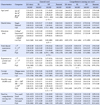Abstract
Purpose
This study was done to identify and compare nursing performance including job stress, emotional labor and burnout between nurses who work in comprehensive nursing care service wards and general wards.
Methods
Participants were 187 nurses working in a general hospital in Busan which provides comprehensive nursing care service (comprehensive nursing care service ward: 95, general ward: 92). Data were collected using questionnaires and analyzed using descriptive statistics, χ2 test, t-test, ANOVA, and multiple regression with the SPSS/WIN 23.0 program.
Results
There was no significant difference in the variables between comprehensive nursing care service ward nurses and general ward nurses. Factors influencing burnout were emotional labor in comprehensive nursing care service ward nurses while job stress and emotional labor were the factors influencing burnout in general ward nurses.
References
1. Hwang NM. An analysis of the debates on introduction of public caregivers services in acute medical centers. Health Welf Policy Forum. 2010; 170:60–71.
2. Hwang NM. Institutionalization of care service issues and tasks. Health Welf Issue Focus. 2012; 47:1–8.
3. Lee JM. Comparative study about the clinical nurse's job stress and turnover intention between a nursing care system wards and a general wards. Soc Sci Res. 2016; 6:1–48.
4. National Health Insurance Service. 2016 Guide comprehensive nursing care service [Internet]. Seoul: National Health Insurance Service;2016. updated September 1, 2016. cited 2017 February 28. Available from: http://www.nhis.or.kr/bbs7/boards/B0040/21012.
5. Lee E, Chang SS. Factors influencing depression of nurses among comprehensive nursing care service ward. Korean J Occup Health Nurs. 2016; 25(4):340–351. DOI: 10.5807/kjohn.2016.25.4.340.
6. Park KO, Yu M, Kim JK. Experience of nurses participating in comprehensive nursing care. J Korean Acad Nurs Adm. 2017; 23(1):76–89. DOI: 10.11111/jkana.2017.23.1.76.
7. Shin SR, Park KY. Comparing satisfaction with nursing care and factors relevant to hospital revisit intent among hospitalized patients in comprehensive nursing care units and general care units. J Korean Acad Nurs Adm. 2015; 21:469–479. DOI: 10.11111/jkana.2015.21.5.469.
8. Yeun YR. Effects of comprehensive nursing service on the nursing performance, job satisfaction and customer orientation among nurses. J Korea Acad Ind Coop Soc. 2015; 16(1):317–323. DOI: 10.5762/KAIS.2015.16.1.317.
9. Kwag WH. Contents and problem for demonstration project about comprehensive nursing service. Healthc Policy Forum. 2015; 13(2):50–55. http://www.rihp.re.kr/research/forum/?uid=1659&mod=document&pageid=1.
10. Lee NS, Koh MS. Comparative study for the clinical nurses' work satisfaction, job stress and turnover intention - in general ward, comprehensive nursing care service ward, and anshim unit. J Korea Acad Ind Coop Soc. 2015; 16(1):516–526. DOI: 10.5762/KAIS.2015.16.1.516.
11. Im JA. Factors affecting turnover intention of nurses in comprehensive nursing care wards: Job stress, emotional labor and burnout [master's thesis]. Incheon: Gachon University;2015. 1–66.
12. Lee MK, Jung DY. A study of nursing tasks, nurses' job stress and job satisfaction in hospitals with no guardians. J Korean Acad Nurs Adm. 2015; 21:287–296. DOI: 10.11111/jkana.2015.21.3.287.
13. Maslach C, Goldberg J. Prevention of burnout: New perspectives. Appl Prev Psychol. 1998; 7(1):63–74. DOI: 10.1016/S0962-1849(98)80022-X.
14. Chang SJ, Koh SB, Kang DM, Kim SA, Kang MG, Lee CG, et al. Developing an occupational stress scale for Korean employees. Korean J Occup Environ Med. 2005; 17(4):297–317.
15. Morris JA, Feldman DC. The Dimensions, antecedents and consequences of emotional labor. Acad Manage Rev. 1996; 21(4):986–1010. DOI: 10.5465/amr.1996.9704071861.
16. Kim MJ. Effects of the hotel employee's emotional labor upon the job-related attitudes. J Tourism Sci. 1998; 21(2):129–141.
17. Lee WH, Kim CJ, Yoo JS, Hur HK, Kim KS, Lim SM. Development of a clinical competency measurement tool for students. Yonsei Nurs. 1990; 13:17–29.
18. Kwon IG, Jung KH, Cho HS, Hwang JW, Kim JY, Jeon KO, et al. Development and validation of the core competency evaluation tool for new graduate nurse's preceptor. J Korean Acad Nurs Adm. 2002; 8(4):535–549. http://www.dbpia.co.kr/Journal/ArticleDetail/NODE06641220.
19. Maslach C, Jackson SE. The measurement of experienced burnout. J Occup Behav. 1981; 2(2):99–113. DOI: 10.1002/job.4030020205.
20. Jung HY. A Study on Relationship among Violence Experience, Coping and Burnout of Emergency Department Nurses. [master's thesis]. Gimhae: Inje University;2007. 1–76.
21. Choi HN. Comparing the emotional labor, job stress and nursing performance of nurses between integrated nursing and care service ward and general ward [master's thesis]. Incheon: Konyang University;2017. 1–68.
22. Hwang NM. Expend comprehensive nursing for the quality of hospitalization service in healthcare organization. Issue Focus. 2015; 7:1–8. http://www.dbpia.co.kr/Article/NODE06383658.




 PDF
PDF ePub
ePub Citation
Citation Print
Print






 XML Download
XML Download